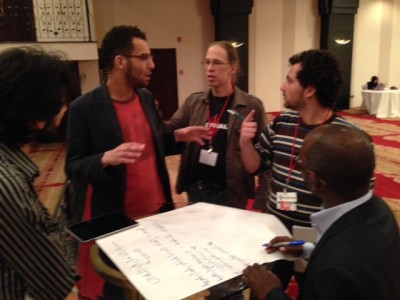On day one of the Arab Bloggers Meeting, participants threw themselves into workshops and discussions stemming from our central theme: civic expression and action online. Working in groups divided by interest — storytelling, digital security, data visualization, and Internet policy — we found that many of us are facing similar challenges in our work.
Many of us want to find new, innovative, compelling ways to tell stories. In the storytelling session, Syrian participants pointed to the mainstream coverage of violence in their country and raised the question: How do you find new ways to tell an old or familiar story? How do you work to keep the public actively engaged and interested in stories about a violent conflict over a long period of time? A common desire among participants was to develop strong methods for telling stories, presenting data, and making policy arguments in order to affect political or legal reforms.

In the Internet Policy session, participants looked at the various entities that govern the internet. They were introduced to how different countries connect to the internet through submarine cables and which countries are more vulnerable to internet outages.
The data visualization track started with an introduction by Ramzi Jaber from Visualizing Palestine, who shared examples of compelling infographics and discussed how to find powerful narrative in dry data or numbers, and how to address different audiences.
The digital security group focused more on the notion of security and threat, modelling before delving into a more hands-on participatory approach where people shared their skills and helped each other address specific issues. In the following days they’ll be exploring more surveillance self-defense materials.
The afternoon saw a provocative series of presentations from a small group of academic researchers working in the field of communications studies and social anthropology. When we ‘like’ things on Facebook, retweet our friends’ ideas, are we participating in “communicative capitalism”? Jodi Dean gave us a striking counter-narrative to the (perhaps dominant) notion of the Internet as a democratic, “even-playing field”, pointing to how capitalistic economic power dynamics reproduce themselves in the online environment.
Anthropologist Jon Anderson spoke of how coverage of the uprising in Egypt embodied a slow refinement of individual ideas, concerns, fears, and complaints into a single, dominant message: we must overthrow the regime. In the end, this was a powerful driver of the events that took place in 2011 — but what of the narratives that were cast aside in the process?
Korinna Patelis shared with us an idea about software — she suggested that most kinds of software require users to co-write a “script”. Facebook, for example, requires users to generate narratives and images of the self in a circumscript way — this politicizes us in ways we may not even be aware of. And the more we say, the more data is created.
Tuesday will see more hands-on learning, more experience sharing, and a Geek Cabaret!